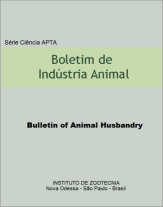Lipid oxidation in eggs from hens with 46 weeks created in an organic and conventional system
Keywords:
egg quality, storage time, TBARSAbstract
The egg is known as one of the most complete foods because it has a rich source of nutrients, with an excellent balance of fats, carbohydrates, minerals and vitamins, and especially proteins, being the second best source of protein available for human consumption, second only into breast milk. However, it is an ideal for growth of pathogenic microorganisms and because it is a product of animal origin, such as meat and its derivatives means, is a highly perishable food and can quickly lose its quality. The eggs are important constituents of the diet, may help to improve the diet of the poor. In shell eggs are considered resistant to lipid oxidation, but studies have shown that commercial egg yolk lipids undergo oxidation during storage. Organic eggs are produced by hens receiving a diet 100% organic, grown in conditions that value their well-being and natural behavior, with some prohibited practices such as beak trimming and confinement in cages. The experiment was conducted to evaluate the effect of storage time on lipid oxidation of egg yolks organic and conventional eggs from hens Isa Brown, collected at 46 weeks of age. Eggs were collected and stored in plastic trays under ambient temperature conditions (25°C) using 100 eggs for analysis of the process of TBARS with ten repetitions for different storage periods, corresponding to 0, 7, 14, 21 and 28 days (Table 1). The results obtained were subjected to analysis of variance using the Statistical Package SISVAR and means were compared by Tukey test at 5% significance.Downloads
Downloads
Published
Issue
Section
License
Os autores não serão remunerados pela publicação de trabalhos, pois devem abrir mão de seus direitos autorais em favor deste periódico. Por outro lado, os autores ficam autorizados a publicar seus artigos, simultaneamente, em repositórios da instituição de sua origem, desde que citada a fonte da publicação original seja Boletim de Indústria Animal. A revista se reserva o direito de efetuar, nos originais, alterações de ordem normativa, ortográfica e gramatical, com vistas a manter o padrão culto da língua e a credibilidade do veículo. Respeitará, no entanto, o estilo de escrever dos autores. Alterações, correções ou sugestões de ordem conceitual serão encaminhadas aos autores, quando necessário. Nesses casos, os artigos, depois de adequados, deverão ser submetidos a nova apreciação. As opiniões emitidas pelos autores dos artigos são de sua exclusiva responsabilidade. Todo o conteúdo deste periódico, exceto onde está identificado, está licenciado sob a Licença Creative Commons Attribution (CC-BY-NC). A condição BY implica que os licenciados podem copiar, distribuir, exibir e executar a obra e fazer trabalhos derivados com base em que só se dão o autor ou licenciante os créditos na forma especificada por estes. A cláusula NC significa que os licenciados podem copiar, distribuir, exibir e executar a obra e fazer trabalhos derivados com base apenas para fins não comerciais.













